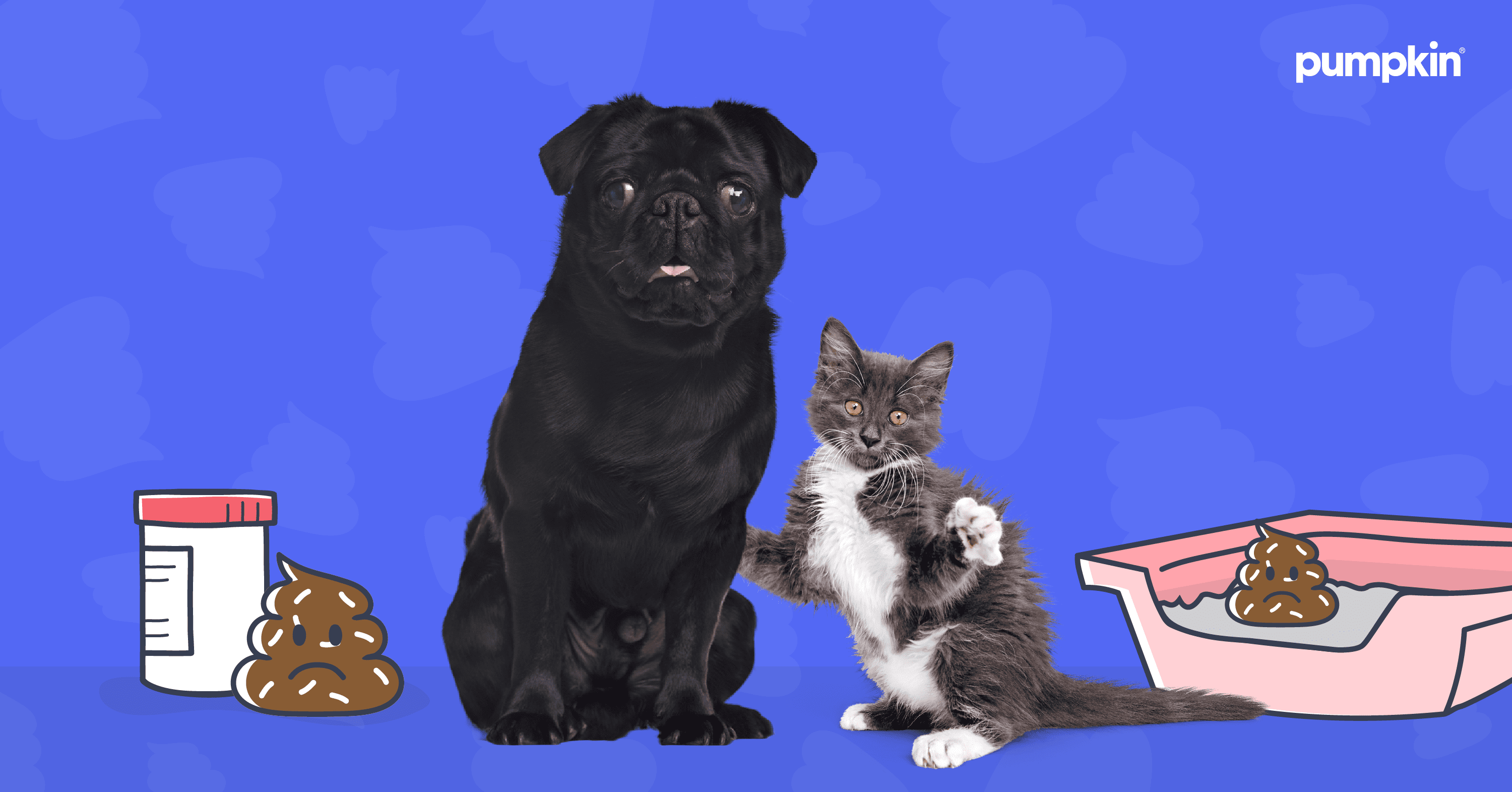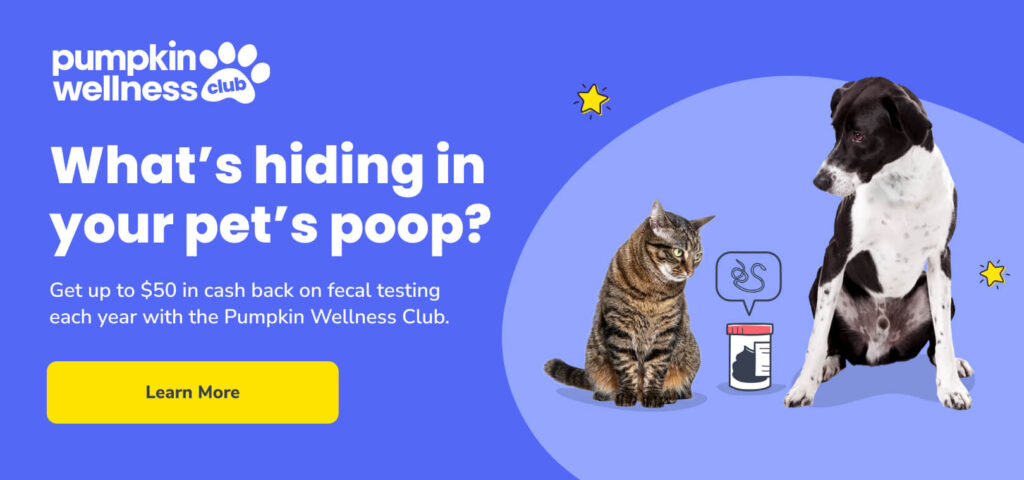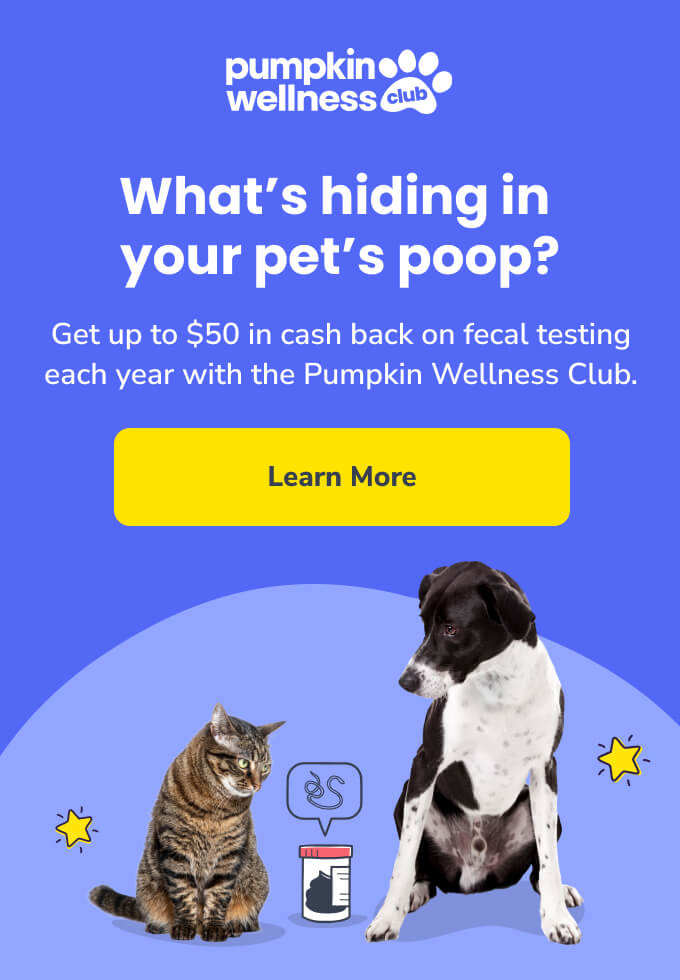Key Points
- Fecal exams are effective tests veterinarians perform on your pet’s poop to screen for and diagnose various illnesses.
- Many pet insurance plans cover fecal exams if they are used as a diagnostic test for an unexpected accident or illness, but pet insurance doesn’t typically cover preventive care.
- Pumpkin recently launched the Pumpkin Wellness Club, a new program that helps pet parents save and get cash for routine preventive care services like fecal testing, annual vet visits, vaccinations, and blood work.*
When something’s up with your pet, your vet uses all kinds of tests to figure out what’s wrong and how they can effectively treat it. Fecal exams do exactly that!
By taking a closer look at your pet’s poop – and we mean really close under a microscope – fecal exams can be used to help diagnose specific conditions or to check your pet’s overall health at their annual checkup.
As fecal exams are fairly common, pet owners want to know: Does pet insurance cover fecal exams? We’ll address when pet insurance may cover fecal exams, other options for saving on the cost of veterinary care, and the importance of fecal exams in maintaining your pet’s overall health.
What is a fecal exam?
A fecal exam is a test veterinarians use to check your pet’s poop for any illness or infection. Fecal exams are commonly used to test for things like parasite infections or to determine the FeLV status of cats.
When might my pet need a fecal exam?
There are two scenarios in which your pet may need a fecal exam:
As part of an annual checkup
In order to keep your pet healthy year-round, it’s a great idea to take your pet to the vet for an annual checkup. At an annual checkup, your veterinarian will examine your pet to ensure they are healthy. This typically involves a head-to-tail examination, blood work, a fecal exam, and even some preventive vaccines (such as the combo vaccine DHPP) if your veterinarian recommends them. A fecal exam is typically used as a heartworm test, and to test for other internal parasites in your pet.
To diagnose an illness or condition
Your dog’s poop can help a veterinarian confirm whether they have a particular illness, most notably a parasite infection. Imagine your dog has suddenly lost weight, and their coat appears dry and dull. These are clear symptoms of hookworm, so your veterinarian requests a fecal sample to test and confirm if hookworms are present. The test confirms your dog has hookworms, so your vet prescribes the Rx medication needed to treat the worms.
Does pet insurance cover fecal exams?
Pet insurance is designed to cover diagnostics and treatments for unexpected accidents and illnesses. Given this, many pet insurance plans would cover a fecal exam if the veterinarian performed it to diagnose a covered illness or condition.
Fecal exams would not be covered by most standard pet insurance plans if they are performed solely as a preventive health care measure. This means that if your veterinarian recommends a fecal exam as part of your pet’s annual checkup, and no illness is present, most standard pet insurance plans would not be able to cover this.
However, this may not always be the case. Imagine your dog has tapeworm, but is showing no symptoms. At their annual checkup, your veterinarian performs a fecal test and discovers that your dog is infected with tapeworm. This fecal exam could then be covered by many pet insurance plans, as it diagnosed a parasite infection that was already present in your dog.
While pet insurance doesn’t typically cover preventive fecal testing, Pumpkin has introduced a new program that actually pays you for providing your pet with the routine preventive care that they need to stay healthy. Depending on your membership level and monthly fee, the Pumpkin Wellness Club can save you up to $390 per year, between access to discounts on top pet wellness products and payments towards veterinary services like fecal testing, annual wellness visits, and flea & tick prevention.
Fecal exams would also not be covered by most pet insurance plans if they diagnose a pre-existing condition. Pre-existing conditions are illnesses or accidents that occur before your pet insurance plan coverage starts or during a waiting period.
It is important to consult your specific pet insurance policy to understand whether your plan can cover fecal exams. Every pet insurance provider is different, with unique coverage options and exclusions.
Does pet insurance cover diagnostic tests?
Yes, most pet insurance covers diagnostic tests used to tell if an accident has happened or an illness is present in a pet. Accident and illness insurance plans are designed to cover the diagnostic care and treatments your pet needs to recover from an accident or illness.
It’s important to remember that a diagnostic test is different from a test carried out for preventive purposes. Let’s compare these two scenarios:
- Diagnostic – Your cat is lethargic and refuses to eat. Your vet performs a diagnostic blood test to see if it reveals that your cat is suffering from an accident or illness.
- Preventive – At the beginning of the year you bring your cat to the vet for an annual health checkup. As part of this checkup, your vet does a blood test, and the results come back normal, indicating there’s nothing to worry about.
In scenario one, many pet insurance plans would cover the diagnostic blood test because it was used for a covered condition. The cat parent would submit an insurance claim to their pet insurance provider, and then receive reimbursement for all eligible expenses once the claim is approved.
What types of diagnostic tests does pet insurance cover?
Here are some examples of common diagnostic tests that pet insurance can cover when an unexpected accident or illness occurs:
- X-rays and radiographs
- MRI scans
- CT scans
- Urinalysis
- Ultrasounds
- Fecal exams
If my pet is ill, will pet insurance cover the treatment?
Pet insurance plans cover treatment for unexpected accidents and illnesses. For example, Pumpkin Pet Insurance plans cover crucial accident & illness treatment options such as:
- Emergency hospitalization
- Surgery
- Rx medication
- Specialized care
- Rx food like prescription diets to manage a covered condition
- Rx supplements
- Alternative therapies like acupuncture or hydrotherapy
Do routine care or pet wellness plans cover fecal exams?
Many pet insurance companies offer add-on coverage for routine care costs. Different providers refer to this type of add-on coverage as wellness care, routine care, and preventive care interchangeably. They all usually refer to the same thing – care or procedures you get for your pet that are designed to prevent future accidents and illnesses from occurring.
With preventive care in mind, Pumpkin recently introduced the Pumpkin Wellness Club, a new way to help pet parents save on annual and everyday wellness needs. The Wellness Club gives you cash towards your pet’s routine preventive care, including $50 in cash on your dog’s fecal testing each year, and $40 on your cat’s. Members also get access to special discounts on top pet brands and cash for other important preventive care services, like vaccinations and wellness checkups, bringing your potential yearly savings to up to $360 for dogs, and up to $390 for cats.
When your pet goes to the vet for a wellness visit, they may receive a variety of preventive care procedures such as:
- Spay/neuter procedures
- Dental cleanings
- Vaccines
- Rx medication for parasite prevention, like heartworm prevention
- Fecal exams (when no illness is present)
- Blood work (when no illness is present)
Remember, every provider’s wellness plan is different. A fecal exam is a preventive care service that is included in some wellness plans, but not all.
Some plans will partially cover the exam by reimbursing you a set amount according to a benefit schedule. A benefit schedule is a list of covered services with a corresponding maximum dollar amount that the provider will reimburse for that service. It’s also possible to have a maximum annual benefit that could go towards any combination of services on the plan’s list. The problem with this is that your pet may not need all the services on the list in any given year.
FAQS
DISCLOSURE






